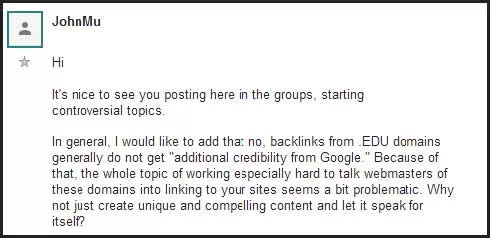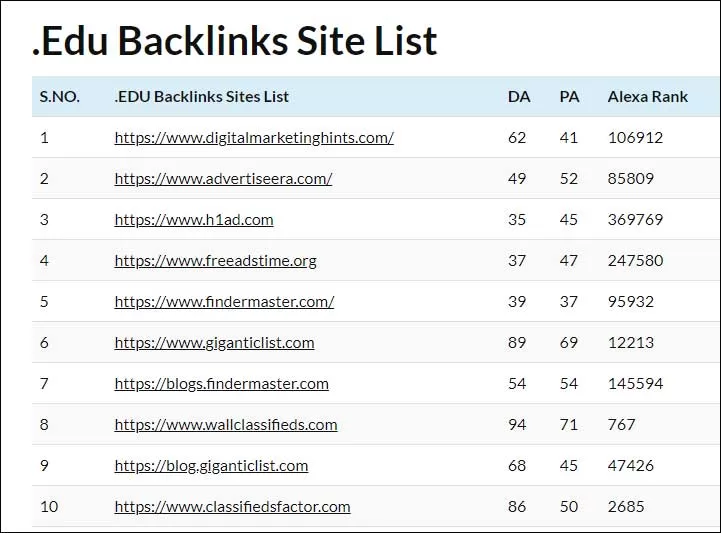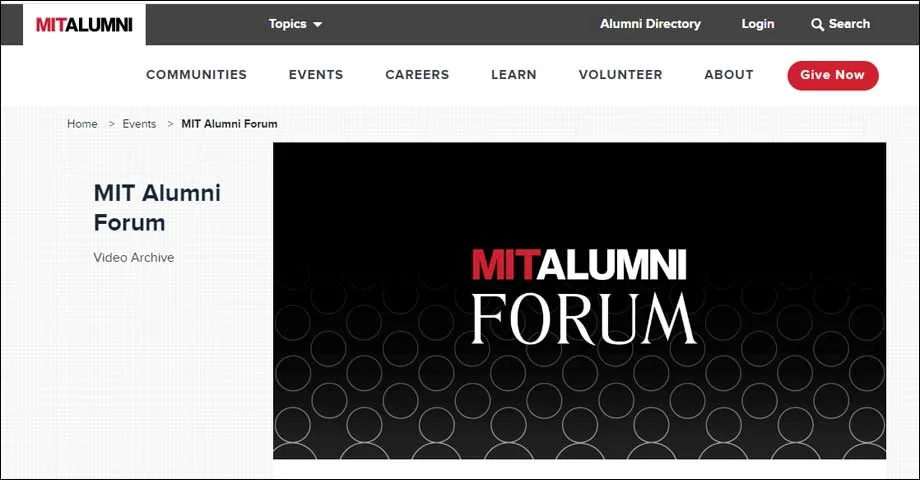Everyone is curious about edu or gov TLD backlinks for their site. Do you know edu backlinks provide additional value to your website or not? The answer is not so simple to say. I did some research about it. My findings will help you to understand, the SEO benefit of educational backlinks. This article will tell you the way of getting edu backlinks. I will also give you an edu backlink site list for free.
Table of Contents
What are edu backlinks?
Edu backlinks, also known as educational backlinks, are links from websites that have the .edu domain extension. The .edu domain extension is reserved for educational institutions such as universities, colleges, and educational organizations.
In the context of search engine optimization (SEO), backlinks play a significant role in determining a website’s authority and credibility. Search engines consider backlinks as a vote of confidence or a recommendation from one website to another. When high-quality websites, including .edu domains, link to your website, it can positively impact your website’s search engine rankings.
edu backlinks are valuable or not?
The quality and relevance of the linking site, as well as the context in which the backlink is placed, also play a crucial role. Building a diverse and natural backlink profile that includes a mix of high-quality edu backlinks along with other authoritative and relevant backlinks is generally considered a more effective strategy for SEO.
But actually, there are no poofs that edu backlinks have extra value in SEO and increasing credibility. In fact, Google’s John Mueller wrote just the opposite in a Google Group.

But Reality goes against the statement. According to many website owners and SEO Experts, edu backlinks provide credibility and also help to improve Search Rankings. A lot of case studies also show the benefits of backlinks come from edu and gov TLD.
However, besides the argument, backlinks from any TLD are important to increase Domain Authority(DA) if the link is niche relevant. So Link building is a good practice for SEO.edu backlinks are also good for your website if your niche is Education related. Otherwise, it may not carry any value for you.
For example: If you have a dog food-related website & got backlinks from Oxford University. It will carry no value for you. On the other hand, suppose you sell online courses and Oxford University gives you a backlink. It will be a strong vote for you. This backlink will increase your credibility and trustworthiness.
Difference of edu backlinks from other types
Edu backlinks, referring to backlinks from educational websites with .edu domains, do possess some distinguishing characteristics that set them apart from other types of backlinks:
| Characteristics | Edu Backlinks | Other Types of Backlinks |
|---|---|---|
| Credibility and Authority | Linked from reputable educational institutions, which are considered authoritative sources of information | Authority and credibility may vary depending on the linking website’s reputation and industry relevance |
| Trust from Search Engines | Edu domains are often viewed as trustworthy by search engines, potentially carrying more weight in algorithmic assessments | Trustworthiness is evaluated based on the reputation, quality, and relevance of the linking website |
| Niche Relevance | Often highly relevant to specific educational subjects or academic disciplines | Relevance can vary depending on the nature of the linking website and its alignment with the linked content |
| Targeted Audience | Can attract a targeted audience comprising students, educators, researchers, and academic communities | Audience composition may vary depending on the nature of the linking website and its target audience |
| Impact on SEO | Edu backlinks can contribute to improved search engine rankings and visibility due to their perceived authority and relevance | Other types of backlinks can also positively impact SEO, depending on the quality, relevance, and diversity of the overall backlink profile |
However, it is important to note that not all edu backlinks automatically possess these advantages. The quality and relevance of the linking website, as well as the context and placement of the backlink, are crucial factors in determining the true value of any backlink, including edu backlinks. A diverse and natural backlink profile, consisting of a mix of authoritative and relevant links, is generally considered more effective for overall SEO strategies.
Finding Edu Backlinks opportunity
Finding opportunities for Edu backlinks requires a targeted approach. Here are some strategies to identify and pursue Edu backlink opportunities:
Research Educational Websites
Conduct thorough research to identify authoritative educational websites relevant to your industry or niche. Look for universities, colleges, schools, and educational organizations that have websites or resource pages related to your content.
Researching educational websites is a crucial step in finding opportunities for Edu backlinks. Here are some strategies to conduct effective research:
- Use Search Engines: Start by using search engines like Google and Bing to search for educational institutions, universities, colleges, and schools related to your industry or niche.

Use relevant keywords along with terms like “edu,” “resources,” or “links” to refine your search.
- Explore Educational Directories: Look for online directories or listings specifically focused on educational websites. These directories often categorize educational institutions based on subjects, locations, or types of education.

Examples include university directories, educational organization directories, and scholarship websites.
- Check Department Websites: Explore individual department websites within universities or colleges. Academic departments often have dedicated pages featuring resources, links, or recommended readings related to their respective fields. These department-specific pages can be great opportunities for Edu backlinks.
- Research Educational Blogs and Forums: Identify popular educational blogs, forums, or discussion platforms within your industry. These platforms are often frequented by educators, students, and professionals in the field.

Engage with the community, contribute valuable insights, and establish connections that may lead to backlink opportunities.
- Utilize Backlink Analysis Tools: Take advantage of backlink analysis tools like Ahrefs, SEMrush, or Moz to analyze the backlink profiles of educational websites and competitor websites. These tools can help identify existing Edu backlinks and uncover potential linking opportunities.
- Follow Academic Journals and Publications: Stay updated with academic journals and publications related to your industry. These publications often have associated websites where they publish research articles, whitepapers, or academic resources. Contact the authors, editors, or website administrators to explore possibilities for backlinks or collaborations.
- Engage with Educational Communities on Social Media: Follow and engage with educational communities, groups, and influencers on social media platforms like LinkedIn, Twitter, or Facebook. Participate in discussions, share valuable content, and build relationships with individuals and organizations in the educational space. This engagement may open doors to potential Edu backlink opportunities.
Remember to keep track of the websites you discover during your research and maintain organized records of contact information or notes on potential opportunities. This will help streamline your outreach efforts when you are ready to approach educational websites for backlink opportunities.
Explore Resource Pages
Many educational websites have resource pages that link to external content. Find resource pages that align with your expertise or content and reach out to the webmasters or administrators with a polite request to include your website as a valuable resource.
Exploring resource pages on educational websites can uncover valuable opportunities for Edu backlinks. Here’s how you can effectively navigate and leverage resource pages:
- Identify Relevant Resource Pages: Start by identifying educational websites within your industry or niche that have dedicated resource pages. These pages are often categorized based on subjects, topics, or resources available.
- Review Existing Content: Analyze the content already featured on the resource pages. Look for topics, articles, or resources that are similar or related to your website’s content. This will help you determine if your website or specific content can provide additional value to the resource page.
- Evaluate Linking Criteria: Pay attention to any guidelines or criteria mentioned on the resource pages. Some resource pages may have specific requirements for inclusion, such as content quality, domain authority, or relevance. Ensure that your website meets the specified criteria before reaching out.
- Craft a Personalized Outreach: Once you’ve identified relevant resource pages, craft a personalized outreach message to the webmasters or administrators. Introduce yourself, explain why your website or content would be a valuable addition to their resource page, and provide a compelling reason for them to consider including your backlink.
- Highlight Unique Value: Emphasize the unique value your website or content brings to the table. This could be in the form of comprehensive guides, in-depth research, tools, or other resources that align with the educational focus of the website.
- Offer Collaboration or Contribution: In addition to requesting a backlink, consider offering collaboration or contribution opportunities to enhance the value of the resource page. This could involve creating guest posts, contributing exclusive content, or providing expert insights for their audience.
- Follow-Up and Maintain Relationships: If you don’t receive an immediate response, don’t hesitate to follow up politely after a reasonable period. Building relationships with webmasters or administrators can lead to future opportunities, so maintain a positive and professional connection even if your initial outreach doesn’t result in a backlink.
Remember to keep track of your outreach efforts, including the websites you’ve contacted, the dates of outreach, and any responses or outcomes. This organization will help you manage your ongoing efforts and ensure follow-up when needed.
Guest Posting on Educational Platforms
Seek out educational platforms, blogs, or online publications that accept guest posts. Craft high-quality, informative articles tailored to the platform’s audience and guidelines. Include relevant backlinks to your website within the guest post, demonstrating your expertise and providing additional value to readers.
- Identify relevant educational platforms.
- Research the guest posting guidelines.
- Understand the platform’s target audience.
- Brainstorm topic ideas aligned with the platform’s focus.
- Craft a compelling pitch summarizing your proposed topic.
- Write a high-quality guest post following the platform’s guidelines.
- Edit and proofread your guest post for errors and consistency.
- Submit your guest post according to the platform’s submission process.
- Engage with readers and respond to comments on your guest post.
These bullet points provide a quick overview of the key steps involved in guest posting on educational platforms.
Collaborate with Educational Institutions
Establish partnerships or collaborations with educational institutions. This could involve offering workshops, seminars, or guest lectures. In return, you may be able to secure backlinks on their websites, event pages, or partner directories.
Collaborating with educational institutions can be an effective way to acquire Edu backlinks. Here’s how you can initiate collaborations:
- Identify Relevant Educational Institutions: Research and identify educational institutions that align with your industry or niche. Look for universities, colleges, schools, or educational organizations that have a focus on topics related to your website’s content.
- Understand Their Goals and Needs: Gain insights into the goals and needs of the educational institutions you are targeting. Explore their websites, mission statements, programs, and initiatives to understand their areas of focus and how your collaboration can align with their objectives.
- Offer Value and Expertise: Identify ways in which your website or business can provide value to the educational institution. Consider offering workshops, seminars, guest lectures, or other educational resources that can benefit their students, faculty, or academic community. Highlight your expertise and explain how your collaboration can enhance their educational offerings.
- Reach Out to Relevant Departments or Faculty: Contact the appropriate departments, faculty members, or administrators within the educational institution. Craft a personalized message explaining your interest in collaboration, how it aligns with their objectives, and the specific value you can provide. Be clear about your intentions to collaborate and how it can mutually benefit both parties.
- Propose Joint Projects or Research: Suggest joint projects, research studies, or academic initiatives that involve your website/business and the educational institution. Collaborative endeavors can lead to backlinks, as the institution may feature your contributions on its website or provide acknowledgment with a backlink to your website.

- Sponsorships or Scholarships: Explore opportunities to offer sponsorships or scholarships in partnership with the educational institution. This can involve providing financial support for educational programs, research projects, or student scholarships. In return, you may be recognized on the institution’s website with a backlink to your website.
- Establish Relationships: Building relationships with key stakeholders within the educational institution is crucial. Attend conferences, events, or networking opportunities where you can connect with educators, administrators, or students. Foster genuine connections and engage in discussions related to your area of expertise.
- Maintain Ongoing Collaboration: Once a collaboration is established, nurture the relationship by consistently delivering value, participating in joint initiatives, and staying involved with the educational institution’s activities. Regularly communicate and assess new opportunities for continued collaboration and potential backlink acquisition.
Remember that collaborations with educational institutions should be mutually beneficial and focused on providing value to their academic community. Approach the collaboration with genuine intentions and a willingness to contribute to the institution’s goals, which will increase the chances of acquiring valuable Edu backlinks.
Provide Valuable Resources
Create valuable resources specifically aimed at students, educators, or academic communities. This could be in the form of guides, ebooks, research papers, or educational tools. Share these resources with relevant educational websites and institutions, offering them for free and requesting backlinks if they find the resources valuable.
Engage with Educational Communities
Actively participate in online forums, discussion boards, and social media groups focused on education or academic topics. Provide insightful contributions, answer questions, and build relationships with educators, students, and industry professionals. Over time, these connections may lead to potential backlink opportunities.
Monitor Competitors
Keep an eye on your competitors’ backlink profiles and identify any existing Edu backlinks they have acquired. Analyze the sources they have obtained Edu backlinks from and explore the possibility of acquiring similar backlinks for your website.
Remember, when reaching out for backlink opportunities, always personalize your communication, demonstrate the value you can offer, and adhere to any guidelines or requirements specified by educational websites or institutions. Building genuine relationships and providing valuable content is key to securing Edu backlinks.
Legitimacy of Edu Backlinks
Ensuring the legitimacy of Edu backlinks is essential to maintain a strong and credible backlink profile. Here are some key considerations to ensure the legitimacy of Edu backlinks:
- Avoid Link Schemes and Black Hat Techniques: Engaging in link schemes or black hat SEO practices to manipulate Edu backlinks is strongly discouraged. Such practices include buying or exchanging backlinks, participating in link farms, or using automated tools for link building. These techniques can lead to penalties from search engines and damage your website’s reputation.
- Focus on Organic Link Building: Organic link building is the process of naturally acquiring backlinks through high-quality content, genuine relationships, and valuable contributions. Focus on creating valuable resources, engaging with educational communities, and producing content that naturally attracts Edu backlinks from authoritative educational websites.
- Monitor Link Quality and Relevance: Regularly monitor your backlink profile to ensure the quality and relevance of Edu backlinks. Remove or disavow any suspicious or low-quality backlinks that may have been acquired through unethical means or are irrelevant to your website’s content. Tools like Google Search Console and third-party SEO tools can assist in monitoring and managing backlinks.
- Foster Genuine Relationships: Building genuine relationships with educational institutions, educators, students, and relevant stakeholders is crucial. Engage in meaningful conversations, contribute valuable insights, and establish connections within the educational community. Genuine relationships can lead to organic Edu backlinks as your reputation and expertise grow within the educational space.
- Provide High-Quality and Relevant Content: Creating high-quality and relevant content that appeals to educational websites is key. Focus on producing informative resources, research studies, or articles that align with educational topics and add value to the academic community. When your content is valuable and trustworthy, it increases the likelihood of attracting legitimate Edu backlinks.
- Monitor and Maintain Backlink Profile: Regularly monitor your backlink profile to identify any changes, new backlinks, or potential issues. Use tools to analyze the quality, anchor texts, and referring domains of your Edu backlinks. This monitoring helps you detect and address any spammy or irrelevant backlinks, ensuring the legitimacy of your backlink profile.
By adhering to ethical practices, producing high-quality content, and fostering genuine relationships within the educational community, you can build a legitimate and authoritative backlink profile that includes valuable Edu backlinks.
Edu backlink site list 2023
Here is a Downloadable PDF File for you. It Contains 112 High-Quality edu websites where you can easily build your link. SEO Focus Point will always provide you with valuable resources for free. Subscribe to our newsletter to get more valuable and secret resources of SEO.
Conclusion
In summary, Edu backlinks can provide valuable SEO benefits, but they should be acquired ethically and organically. They enhance credibility, improve rankings, and drive targeted traffic. By following best practices and providing valuable content, you can unlock the potential of Edu backlinks. Stay updated on the latest SEO strategies by subscribing to our newsletter for valuable insights and tips. Sign up now to receive our newsletter and stay ahead in the world of SEO!

